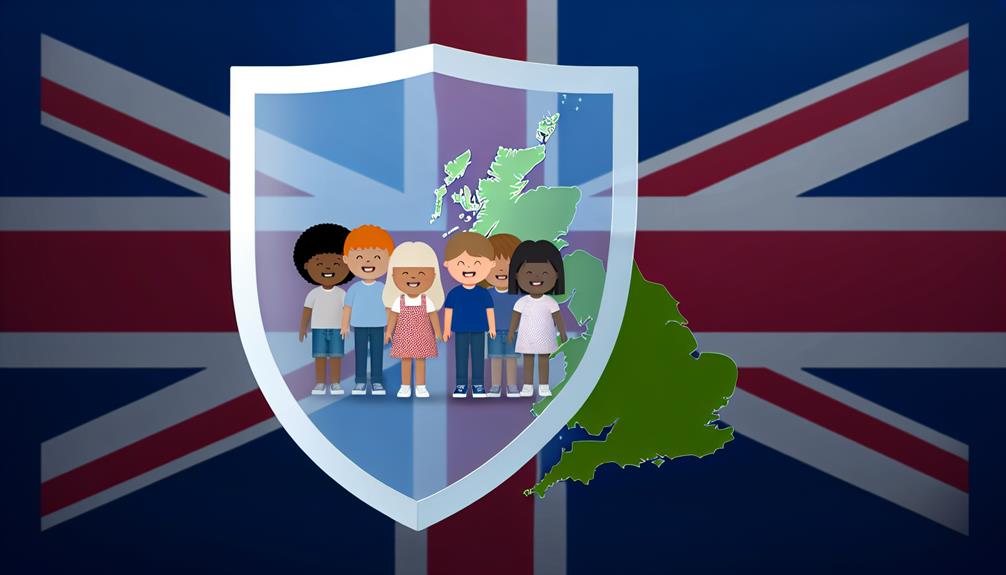In the UK, over 65,000 children are in foster care, safeguarded by a legal framework upholding their rights. Society prioritizes your nurturing and protection, offering a secure, fulfilling life. Your culture and identity are respected, with opportunities for growth and empowerment. You have the right to a stable education and healthcare equality. Therapeutic care helps you develop resilience and emotional stability. Legal provisions protect you from abuse and neglect, valuing consistency and permanence in your upbringing. If ever in doubt, remember, there are procedures to voice concerns and be heard. Explore further to fully grasp the extent of your rights.
Key Takeaways
- Foster children in the UK are legally ensured rights to a secure and fulfilling life, including nurturing, protection, and citizenship rights.
- They have a right to family life in foster care, including respect for their cultural identity, involvement in decisions, and stability.
- Foster children are entitled to educational rights, including stable home life, school integration, and participation in extracurricular activities.
- They possess health and well-being rights, ensuring access to healthcare, emotional stability, and protection from physical, emotional, and sexual abuse.
- The UK framework advocates for stability and permanence in care, and addresses any complaints in the foster care system through established procedures.
Understanding the UK Foster Care System

Exploring the complexities of the UK Foster Care System, it's important to understand that over 65,000 children currently reside with nearly 55,000 foster families across the country. These numbers reflect a dynamic system that constantly evolves to meet the needs of vulnerable children. However, it isn't without its challenges.
Delving deeper into 'Foster Care Challenges', you'll find that matching children with the right families is often a complex process. There's a delicate balance between the child's needs, the foster family's capacity, and the availability of resources. You might also encounter issues with stability; maintaining long-term placements can be difficult due to changes in child behavior, family circumstances, or systemic pressures.
With regard to 'Adoption Procedures', there's a lot to think about. It's a rigorous process, requiring prospective adoptive parents to undergo in-depth assessments and training to make sure they're prepared for the responsibility. The goal is to secure a nurturing and stable environment for the child, but this can be an uphill task, given the emotional complexities involved.
Understanding the UK Foster Care System requires a level of empathy, patience and knowledge. While it's a challenging system to navigate, remember that its ultimate aim is to safeguard the welfare and rights of children.
Legal Framework for Child Rights
Building on our understanding of the UK Foster Care System, let's now shift focus to the legal framework for child rights, a cornerstone in safeguarding the interests of underprivileged children.
This framework, encompassing both 'Parental Responsibilities' and 'Child Citizenship', validates every child's inherent rights, regardless of their circumstances. As you explore further into this subject, you'll come to see how this structure guarantees that all children are treated with dignity and respect.
For starters, 'Parental Responsibilities' is a legal term in the UK, encapsulating the duties, powers, rights, and responsibilities that a parent legally has for their child and the child's property. It emphasizes the importance of nurturing, protecting, and providing for the child's needs.
'Child Citizenship', on the other hand, is about the child's status and their rights as citizens. It safeguards their right to an identity, to express their views freely, and to be protected from abuse or exploitation.
In essence, these laws ensure each child's right to a secure, supported, and fulfilling life. They form a robust shield that safeguards children in the foster care system, ensuring their rights aren't overlooked or infringed upon.
Right to Family Life in Foster Care

Given the significance of a nurturing environment, it's essential for you to understand that the right to family life is a fundamental aspect of foster care in the UK. This right isn't just about providing a safe and secure home, but also about ensuring that the child's cultural identity is respected and recreational opportunities are provided.
Now, let's break this down into four key components:
- Cultural Identity: Foster care should respect and nurture the child's cultural, linguistic and religious background. This includes celebrating important cultural events, teaching the child about their heritage, and promoting understanding and acceptance of their unique identity.
- Recreational Opportunities: The child should have opportunities to engage in leisure activities that promote growth, creativity, and social interaction.
- Inclusive Decision-Making: The child's views should be taken into account in decisions affecting their life, allowing them to feel included and heard.
- Stability and Continuity: The child should be provided with a stable environment, promoting continuity in relationships, education, and overall life.
Educational Rights of Foster Children
In addition to a stable and supportive home life, it's equally important that a foster child's right to education is upheld and prioritised. As a part of your role, you'll face the school integration challenges that often accompany these situations.
Understanding and maneuvering these challenges is vital. Foster children often have to switch schools, leading to disruption in their education. They may also struggle with fitting into a new social environment. As a caregiver, you should work closely with the school to guarantee a smooth shift. This includes sharing necessary information about the child's background and educational needs.
Moreover, foster children have extracurricular participation rights. They should have equal access to activities that can aid in their social and personal development. These activities can provide a sense of normalcy, boost self-esteem, and help them build important life skills.
Health and Well-being Rights

As a foster carer, it's essential that you're aware of the health and well-being rights of the children under your care. Ensuring they've access to necessary medical treatments and services forms the core of these rights.
Additionally, promoting emotional stability is equally significant, as it contributes to their overall well-being.
Ensuring Medical Care Access
You'll often find that ensuring regular access to quality medical care is vital for safeguarding the health and well-being of children in UK foster care. This involves healthcare equality and medication management, which form essential parts of the system.
- Healthcare Equality: Every child should have equal access to healthcare services, regardless of their circumstances.
- Regular Check-ups: Regular medical check-ups are necessary to monitor and manage the child's health.
- Medication Management: Proper management of medication is essential, especially for children with chronic conditions.
- Emergency care: Immediate access to emergency care must be guaranteed.
Promoting Emotional Stability
While ensuring physical health care is important, it's equally necessary to foster emotional stability in children under the UK foster care system. Promoting emotional intelligence is a key strategy as it enhances a child's ability to recognise, understand, and manage their emotions. This leads to improved relationships, behaviour, and academic performance.
Resilience building is another essential aspect. It's about equipping children with the skills to bounce back from adversity. You, as a foster carer, can play an essential role in this aspect by providing a safe, nurturing environment that fosters trust and stability. Remember, your patience, understanding, and commitment can make a significant difference in promoting the emotional health of children in your care.
Participation and Voice Rights
In the domain of UK foster care, guaranteeing the participation and voice rights of every child is paramount. This encapsulates inclusive decision making and youth empowerment, two vital facets that promote a child's sense of autonomy and identity.
- Inclusive Decision Making: It's about involving children in decisions that directly affect them. This doesn't just make them feel valued, but it also encourages their engagement in their own personal growth and development.
- Youth Empowerment: This is about making sure that children have the tools, confidence, and opportunities to express their views and opinions. It's about giving them the power to influence decisions and change their circumstances.
- Respect for Individuality: Each child's voice is unique, hence their experiences, perspectives, and ideas must be respected and valued. This ensures that their individuality is preserved and celebrated.
- Active Participation: Encouraging children to partake in everyday activities and decisions helps them develop necessary life skills and fosters a sense of belonging.
In essence, you're not just fostering a child; you're nurturing an individual who's the right to have their voice heard and their opinions considered. Remember, your role is pivotal in shaping their future. Make it count.
Protection From Abuse and Neglect

Safeguarding a child's safety is paramount in foster care, and shielding them from any form of abuse or neglect is a fundamental responsibility. Recognising signs of abuse or neglect is crucial in fulfilling this duty. You, as a carer or professional, must be well-versed in abuse identification and neglect indicators to guarantee the child's wellbeing.
The table below helps pinpoint key signs of abuse and neglect:
| Abuse/Neglect Type | Identification | Response |
|---|---|---|
| Physical Abuse | Unexplained injuries, reluctance to change clothes | Document, report to social services |
| Emotional Abuse | Developmental delays, extreme behaviour | Provide emotional support, report |
| Sexual Abuse | Inappropriate sexual behaviour, knowledge beyond age | Immediate report, counseling |
| Neglect | Poor hygiene, frequent hunger | Improve living conditions, report |
| Medical Neglect | Untreated illness, missed appointments | Seek immediate medical care, report |
Stability and Permanence in Care
Stability and permanence in care can greatly impact a foster child's life, providing a solid foundation for their growth and development. When a child feels secure in their living situation, it fosters an environment conducive to trauma recovery.
It's worth noting the four key elements that contribute to this stability and permanence:
- Consistent Caregivers: Having a reliable adult presence in a child's life builds trust and emotional security.
- Routine and Structure: Daily routines provide predictability, helping children to feel safe and in control.
- Long-term Placement: A stable, long-term placement can notably reduce feelings of uncertainty and anxiety for the child.
- Cultural Integration: Maintaining a child's cultural identity is essential. It connects them to their roots and aids in their overall social development.
When you, as a foster parent, provide these elements consistently, you're making a significant contribution to the child's wellbeing. Remember, your role isn't just about providing food and shelter. It's also about ensuring the child's emotional and psychological needs are met, to give them the best possible start in life. This is the essence of stability and permanence in care.
Complaints and Advocacy in Foster Care

As a foster parent, it's important to understand that you have a pivotal role in advocating for your foster child's needs, and there are established procedures to address any complaints or issues that may arise in the foster care system.
When concerns emerge, your first step toward complaint resolution should be to voice your concerns, clearly and professionally, to your foster child's social worker or agency.
If this doesn't lead to satisfactory results, you can escalate your complaint to higher authorities within the agency or even to an independent reviewing officer. Advocacy strategies, such as utilising the support of an independent advocate, can be incredibly helpful in these situations.
These advocates are professionals trained to uphold the rights of children in care and can provide you with valuable counsel and support.
Frequently Asked Questions
What Is the Average Age of Children in UK Foster Care?"
You're asking about the average age of kids in UK foster care. It's around 7-9 years old. Age impacts their emotional preparedness for foster care, making it important to understand each child's unique needs.
What Is the Process to Become a Certified Foster Parent in the Uk?"
To become a certified foster parent in the UK, you'll need to meet eligibility criteria, complete rigorous training programs, and undergo a thorough assessment. It's a detailed process, ensuring the best care for foster children.
How Are Foster Families Matched With Children in the Uk?"
In the UK, you're matched with a foster child based on Foster Pairing Criteria, considering factors like age, needs, and Cultural Considerations. It's about ensuring a good fit for both child and family.
What Kind of Financial Support Is Provided for UK Foster Families?"
In the UK, you're given financial support as a foster parent. This comes in the form of Foster Allowances covering child's living costs. Additionally, you're entitled to tax benefits, easing your financial responsibilities further.
How Does the UK Foster Care System Support the Transition to Adulthood for Foster Children?"
In the UK foster care system, you're given Life Skills Training and Emotional Support Provision to facilitate your shift to adulthood. They make sure you're prepared to manage life's challenges independently.
Conclusion
So, there you have it, a whistle-stop tour of the UK foster care system and child rights.
It's a bit like building a puzzle, each piece – family life, education, health, voice, protection, stability, and advocacy – critical to the complete picture.
But remember, despite the official jargon and legal mumbo jumbo, at its heart, it's about giving every child a fair shot at life.
It's the ultimate balancing act, and we're all trapeze artists in this circus of care.




